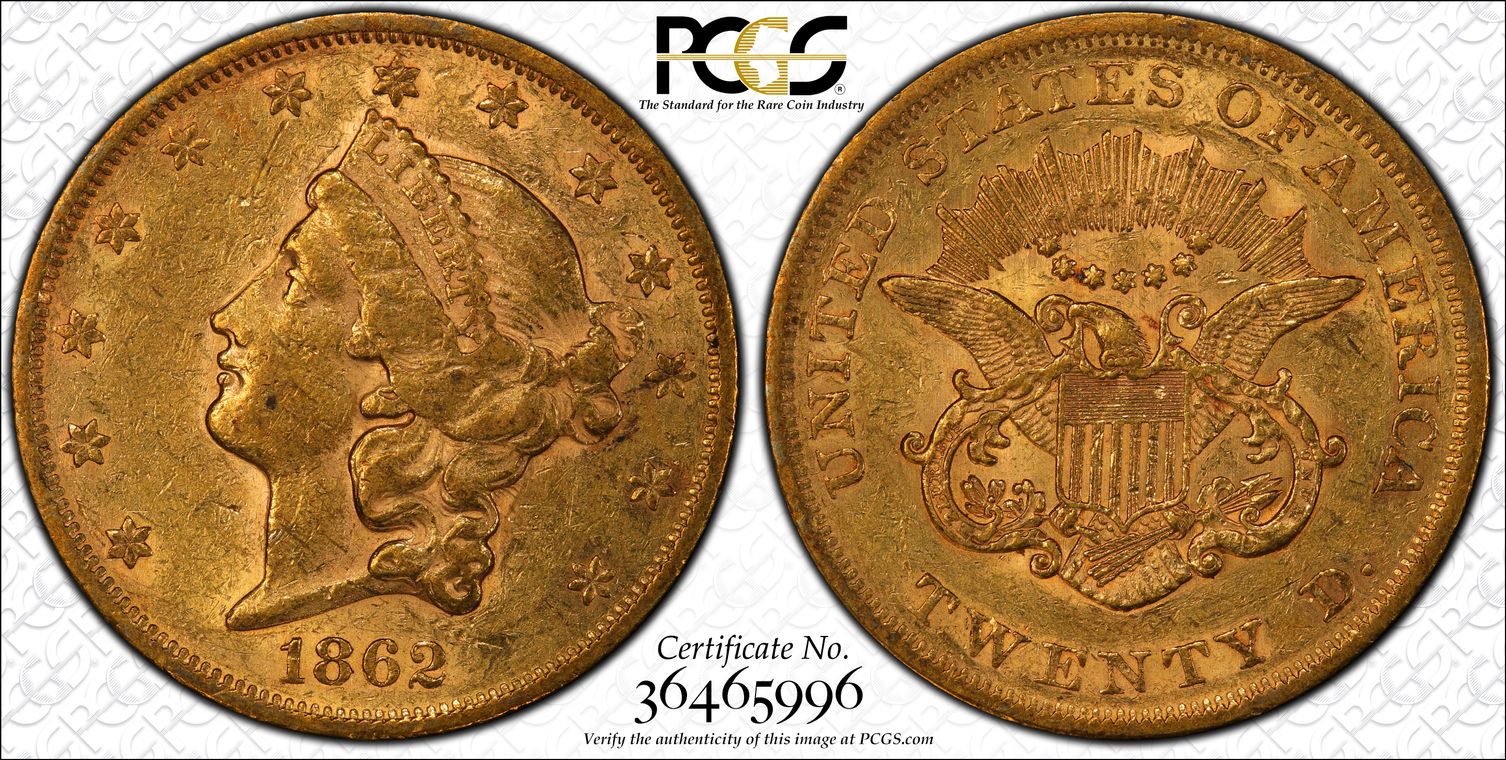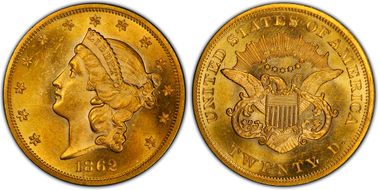1862 $20 AU53 认证号36465996, PCGS号8937
专家评论
Doug Winter
The following information is from my eBook on Type One Liberty Head Double Eagles at http://doubleeaglebook.com/By 1862, production of gold coins at the Philadelphia mint had dwindled greatly. This situation was compounded by hoarding, exporting, and melting of all issues larger than one dollar. As a result, the 1862 double eagle has a very low survival rate. It is the rarest Type One double eagle from this mint (excluding, of course, the excessively rare 1861 Paquet reverse) in terms of overall rarity. In Uncirculated, it trails only the 1859.
STRIKE: The 1862 is not quite as well-struck as the 1860 and 1861 Philadelphia double eagles. The hair detail on the obverse lacks clear individual definition, especially on the curls below the ear. In addition, the hair at the top of the head is soft. The stars are sharp will full radial lines seen on most coins. There is sometimes weakness on the border from 4:00 to 7:00 which corresponds to the reverse. The rest of the reverse is reasonably sharp with the exception of the wing tips and the tail feathers.
SURFACES: Most 1862 double eagles are very heavily abraded although I have, curiously, seen more reasonably clean pieces in the Very Fine-Extremely Fine range than I have in the lower to medium About Uncirculated grades. The typical coin has a below average quality of the surfaces and many have noticeable nicks or dings on the rims. Any example with choice surfaces is worth a strong premium.
LUSTER: This is an issue which has fairly good luster. Higher grade pieces show a frosty texture which is considerably different than that seen on San Francisco double eagles of this era. A small number are semi-prooflike with the obverse showing more depth than the reverse.
COLORATION: The natural coloration is a medium to deep orange-gold hue. Some are more of a pinkish-green. Most 1862 double eagles have been cleaned or dipped and finding an example with natural color is very difficult.
EYE APPEAL: Only a handful of choice 1862 double eagles exist and these tend to be off the market and their owners aren’t eager to part with them. Only four have been approved by CAC as of October 2014 (and three of these grade at least AU58) which shows how hard it is to find a choice, good looking piece. I would assign a premium of as much as 50% for an 1862 in collector grades which was CAC quality.
INTERESTING VARIETIES: No significant varieties are known.
PROOFS: A total of 35 Proofs were struck. The survival rate is higher than for Proof double eagles made in 1859, 1860 and 1861 and it is likely that around 10 to 12 exist. When the first edition of this book was published in 2002, the certified population figures for Proof 1862 double eagles were higher than I expected but the numbers appear to have shrunk due to resubmitted pieces being deleted from the population figures. There appears to be at least two or three Gem proofs known.
As of the middle of 2014, PCGS had graded one in PR62, one in PR64, one in PR64CAM and one in PR65DCAM for a total of four. NGC had graded one in PR63CAM, three in PR64CAM and two in PR65UCAM for a total of six. It is likely that the number of NGC PR64CAM’s is slightly inflated by resubmissions.
The auction record for a Proof of this date is $381,875 set by Heritage 4/14: 5845, which was graded PR65CAM by NGC.
HOARDS: There have been no hoards of this date reported. Eight were found on the S.S. Republic, including four in Uncirculated. The S. S. Brother Jonathan contained just a single 1862 double eagle.
BUYING TIPS: This date was relatively undiscovered until the publication of the first edition of this book in 2002 alerted collectors as to its true rarity. Today, this is a hard-to-find and costly hole in most collectors’ sets. My advice from 2002 remains the same more than a decade later: “Buy any nice 1862 double eagle(s) you are offered and do not be afraid to pay in excess of current published values.”
AUCTION RECORD: The auction record is $70,500 for a PCGS MS62 which sold as Stacks Bowers 2014 ANA: 12025. This coin was earlier sold as Bass III: 809.
FINEST KNOWN: The finest known business strike 1862 double eagle is the NGC MS64 in a New England collection which is ex Heritage 11/05: 2459 at $62,100. The second finest is a PCGS MS63 in the Crawford collection.
RARITY:
TOTAL KNOWN: 150-200
BY GRADE:
Very Fine: 38-40
Extremely Fine: 62-100
About Uncirculated: 38-45
Uncirculated: 12-15
POPULATION FIGURES: As of the beginning of 2015, PCGS had graded two in MS60, two in MS61, four in MS62, and one in MS63 for a total of nine in Uncirculated. NGC had graded three in MS60, three in MS61, five in MS62, three in MS63, and one in MS64 for a total of 15 in Uncirculated. This includes six coins from the S.S. Republic.
CAC has approved just one Uncirculated example, graded MS62.
PERFORMANCE SINCE 2002: In the current market, a choice Extremely Fine example of this date (equivalent to an EF45) is worth $12,500-15,000. When the first edition of this book was published in 2002, the same coin would have sold for $2,500-3,500. In the current market, a choice About Uncirculated example of this date (equivalent to AU55) is worth $20,000-25,000+. When the first edition of this book was published in 2002, the same coin would have been worth $6,000-7,000. I believe that the 1862 double eagle was much undervalued a decade ago and its performance has been very impressive in the ensuing years with increases in the 4x to 5x range.
COMMENTS: With the exception of the small group of coins from the S.S. Republic, there have been no important new 1862 double eagles to sell privately or at auction in almost a decade. The two finest I am aware of have been off the market for a decade or more while the Gilded Age/Bass coin, graded MS62 by PCGS, sold for a record price for the date. This was a coin which I sold to the owner of the Gilded Age collection via private treaty in 2002.
David Akers (1975/88)
This date is very scarce in all grades, and is especially difficult to locate in high grade. In fact, it is more likely to be found in Proof than it is in AU or Unc. Most known specimens grade only VF or EF and I have seen less than a dozen true uncs. A few choice and gem quality mint state pieces do exist but they are very rare. Overall, the 1862 is similar in rarity to the 1868, 1871, 1873 Closed 3 and the 1891 and just a little less rare than the 1859. It is slightly more rare than the 1863 and 1864 as a date but both of the latter are even more difficult to obtain in high grade.PCGS #
8937
设计师
James Barton Longacre
边缘
Reeded
直径
34.00 毫米
重量
33.40 克
铸币数量
92133
金属成分
90% Gold, 10% Copper
更高评级数量
29
评级较低的钱币数量
52
地区
The United States of America
价格指南
PCGS 数量报告
拍卖 - PCGS 评级的
拍卖 - NGC 评级的
稀有性和存量估计 了解更多
| 所有评级 | 215 |
| 60或以上 | 13 |
| 65或以上 | 0 |
| 所有评级 | R-6.8 |
| 60或以上 | R-9.4 |
| 65或以上 | R-10.1 |
| 所有评级 | 9 / 44 |
| 60或以上 | 13 / 44 TIE |
| 65或以上 | 1 / 44 |
| 所有评级 | 16 / 148 TIE |
| 60或以上 | 24 / 148 TIE |
| 65或以上 | 1 / 148 |






















